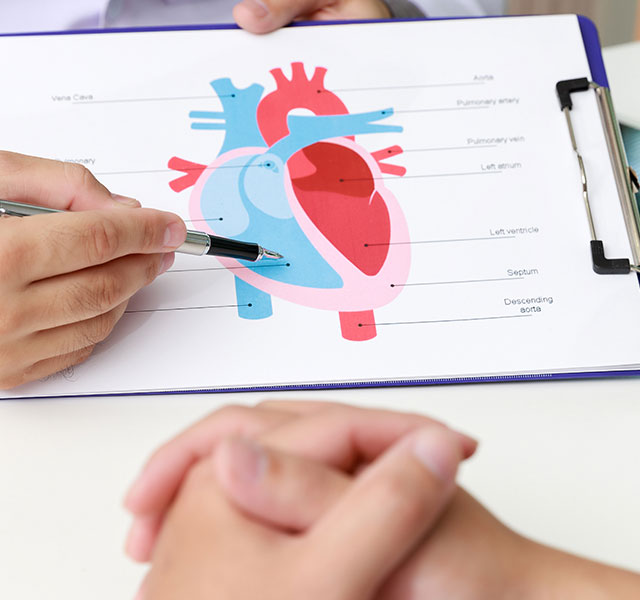Heart failure occurs when the heart muscle can’t keep up with the workload required to pump blood and oxygen throughout the body. This can prevent oxygen-rich blood from circulating properly. Here, Lindsey Aurora, M.D., a cardiologist at Henry Ford Health, explains how heart failure differs from one side of the heart to the other and what experts can do to prevent this condition from progressing.
Left Side Heart Failure
Between left and right sided heart failure, it is more common to have issues on the left side. Left-sided heart failure can briefly present itself in two different ways: systolic or diastolic.
- Systolic heart failure is when the squeezing function of the heart is low – reducing the pumping ability of the heart to push blood into circulation. This is also known as heart failure with reduced ejection fraction.
- Diastolic heart failure is when the heart muscle does not relax normally because of stiffness – making it difficult to properly fill with blood during the resting period between each beat. This is also known as heart failure with preserved ejection fraction.
“Left-sided heart failure can often be the result of other health conditions,” says Dr. Aurora. “For example, having coronary artery disease or high blood pressure can cause more stress on the heart and require it to work harder.”
Other factors that can cause left-sided heart failure include:
- Uncontrolled diabetes
- Obesity
- Aging
- Thyroid problems
- Smoking, alcohol or drug abuse
- Certain types of chemotherapy or radiation
- Family history or genetics
Right Side Heart Failure
Right-sided heart failure usually occurs as a result of left-sided heart failure.
“The left ventricle offers the pumping power needed for the heart to circulate blood,” says Dr. Aurora. “When the left ventricle can’t pump properly, increased fluid pressure can be transferred back through the lungs - which can affect and damage the right side of the heart. Decreased function of the right ventricle can cause blood to back up and collect in the body and veins leading to symptoms such as swelling in your legs i.e. fluid retention.”
How Do I Know If I Have Heart Failure?
Both left and right sided heart failure can overlap in symptoms. Talking to your doctor and testing if indicated will help determine the diagnosis.
“Heart failure can also present itself differently from person to person,” says Dr. Aurora. “Our goal is to identify your condition early and help you manage it diligently.”
Talk to your doctor if you are experiencing any changes in your health that could be signs of heart failure including:
- Shortness of breath (while active, at rest or even while sleeping)
- Persistent coughing
- Buildup of excess fluid in body tissues such as swelling in legs, ankles, abdomen
- Unintentional weight changes
- Excessive fatigue
- Difficulty performing daily activities
- Nausea
- Lack of appetite
Treating And Preventing Heart Failure

Heart Failure Treatment
According to Dr. Aurora, cases of heart failure fall on a spectrum. Some cases can be managed with medications and lifestyle changes. Other cases can progress to patients needing interventions, procedures, or surgery to restore blood flow - or even needing a heart transplant or an artificial heart pump. Specialists assess each case of heart failure to determine which treatment option will be most successful at managing and preventing progression.
“Your outcomes depend on the severity of your case and factors associated with your heart failure,” says Dr. Aurora. “Left versus right sided heart failure can also dictate differences on the treatment recommended.”
If you are worried about your risk of heart failure, talk to your doctor about health conditions that may impact your risk along with any concerning symptoms. Additionally, be mindful and practice a healthy lifestyle as much as possible:
- Eat a heart healthy diet
- Quit smoking and avoid drugs
- Maintain a healthy weight
- Engage in regular physical activity
- Follow treatment recommendations by your doctor for any other medical conditions
“The best thing that you can do is to monitor your health, be proactive and seek medical attention if you begin experiencing any new symptoms,” Dr. Aurora adds. “Our hope is that consistent follow-up with healthcare providers will provide patients the opportunity for the best quality of life.”
Reviewed by Dr. Lindsey Aurora, an Advanced Heart Failure & Transplant Cardiologist who sees patients at Henry Ford Hospital in Detroit, Henry Ford Medical Center in Sterling Heights and Macomb.



